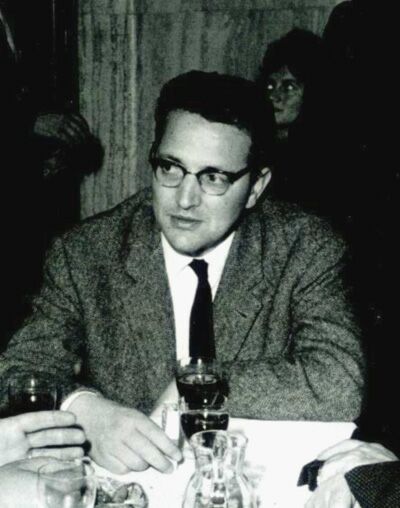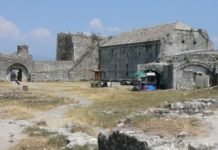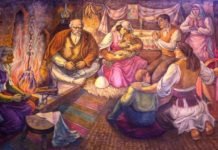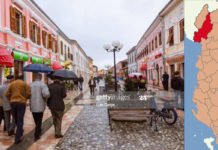Read also:
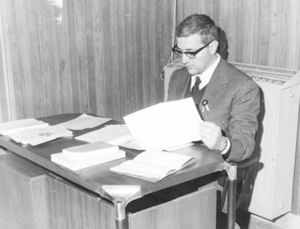
- Ernest Koliqi
- Filip Shiroka
- Gjergj Fishta
- Lazer Shantoja
- Martin Camaj
- Migjeni (poetry)
- Migjeni (prose)
- Ndre Mjeda
- Pashko Vasa
BIOGRAPHY
Camaj (1925-1994) was born in Temali in the Dukagjin region of the northern Albanian alps. He is an émigré writer of significance both for Albanian literature and for Albanian scholarship. He received a classical education at the Jesuit Saverian college in Shkodër and studied at the University of Belgrade. From there he went on to do postgraduate research in Italy, where he taught Albanian and finished his studies in linguistics at the University of Rome in 1960. From 1970 to 1990 he served as professor of Albanian studies at the University of Munich and lived in the mountain village of Lenggries in Upper Bavaria until his death on 12 March 1992.
Camaj’s academic research has concentrated on the Albanian language and its dialects, in particular those of southern Italy. His literary activities over a period of forty-five years cover several phases of development. He began with poetry, a genre to which he remained faithful throughout his life, but in later years also devoted himself increasingly to prose. His first volumes of classical verse Nji fyell ndër male, Prishtina 1953 (A flute in the mountains), and Kânga e vërrinit, Prishtina 1954 (Song of the lowland pastures), were inspired by his native northern Albanian mountains for which he never lost his attachment, despite long years of exile and the impossibility of return. These were followed by Djella, Rome 1958 (Djella), a novel interspersed with verse about the love of a teacher for a young girl of the lowlands.
His verse collections Legjenda, Rome 1964 (Legends) and Lirika mes dy moteve, Munich 1967 (Lyrics between two ages), which contained revised versions of a number of poems from Kânga e vërrinit, were reprinted in Poezi 1953-1967, Munich 1981 (Poetry 1953-1967). Camaj’s mature verse reflects the influence of the hermetic movement of Italian poet Giuseppe Ungaretti (1888-1970). The metaphoric and symbolic character of his language increases with time as does the range of his poetic themes. A selection of his poetry has been translated into English by Leonard Fox in the volumes Selected Poetry, New York 1990, and Palimpsest, Munich & New York 1991.
My land
When I die, may I turn into grass
On my mountains in spring,
In autumn I will turn to seed.
When I die, may I turn into water,
My misty breath
Will fall onto the meadows as rain.
When I die, may I turn into stone,
On the confines of my land
May I be a landmark.
[Vendit tem, from the volume Lirika midis dy moteve, Munich 1967, translated from the Albanian by Robert Elsie and first published in English in An elusive eagle soars, Anthology of modern Albanian poetry, London: Forest Books 1993, p. 32]
To a modern poet
Your road is good:
The Parcae are the ugliest faces
Of classical myths. You did not write of them,
But of stone slabs and of human brows
Covered in wrinkles, and of love.
Your verses are to be read in silence
And not before the microphone
Like those of other poets,
The heart
Though under seven layers of skin
Is ice,
Ice
Though under seven layers of skin.
[Nji poeti të sotëm, translated from the Albanian by Robert Elsie and first published in English in An elusive eagle soars, Anthology of modern Albanian poetry, London: Forest Books 1993, p. 33]
The old deer
The shepherds abandoned the alpine pastures
For the warmth of the lowland valleys,
Sauntering down the trails, talking loudly
About women and laughing
Beside the water of the stream bubbling forth
From well to well.
The old deer raised its head from the scorched eartz
And observed the pale foliage. Then
It departed to join its sons,
They too with their minds on the does.
Broken, it too abandoned the alpine pastures and followed
The merry murmur of the stream below, a fiery arrow,
The wanderer in search of warmer pastures and winter grass
Which it will never touch!
When they slew it, the shepherds pried its eyes open
And saw in the pupils
The reflection of many deer drinking water from the stream.
[Dreni plak, translated from the Albanian by Robert Elsie and first published in English in An elusive eagle soars, Anthology of modern Albanian poetry, London: Forest Books 1993, p. 34]
Mountain feast
Blood was avenged today.
Two bullets felled a man.
Blood was avenged today.
Under the axe-head
The ox’s skull bursts by the stream.
(Today there will be great feasting!)
Blood was avenged today.
The wailing of men gone wild
Mingles with the smell of meat on the fires
And the autumn foliage falls
Scorched on the white caps
At the tables, outside.
Night. At the graves on the hill
Fresh earth, new moon.
The wolves have descended from the mountains
And drink blood at the stream.
[Drekë malsore, from the volume Lirika midis dy moteve, Munich 1967, translated from the Albanian by Robert Elsie and first published in English in An elusive eagle soars, Anthology of modern Albanian poetry, London: Forest Books 1993, p. 35]
First elegy
When I am exhausted
By the tribulations of age, steep like a cliff,
Feel no pain for me, Taze,
Stretched out on the bier,
A lamb ready for sacrifice.
Let the old women mourn over me that day
For their own people long since dead.
And one more request, my wife:
When my father died, we slaughtered two oxen
To feed the starving – and the ants of the threshing-floor
With breadcrumbs.
But I shall die amidst people who are
Always full,
So at my wake serve
Only bitter coffee.
[Drekë malsore, from the volume Lirika midis dy moteve, Munich 1967, translated from the Albanian by Robert Elsie and first published in English in An elusive eagle soars, Anthology of modern Albanian poetry, London: Forest Books 1993, p. 36]

